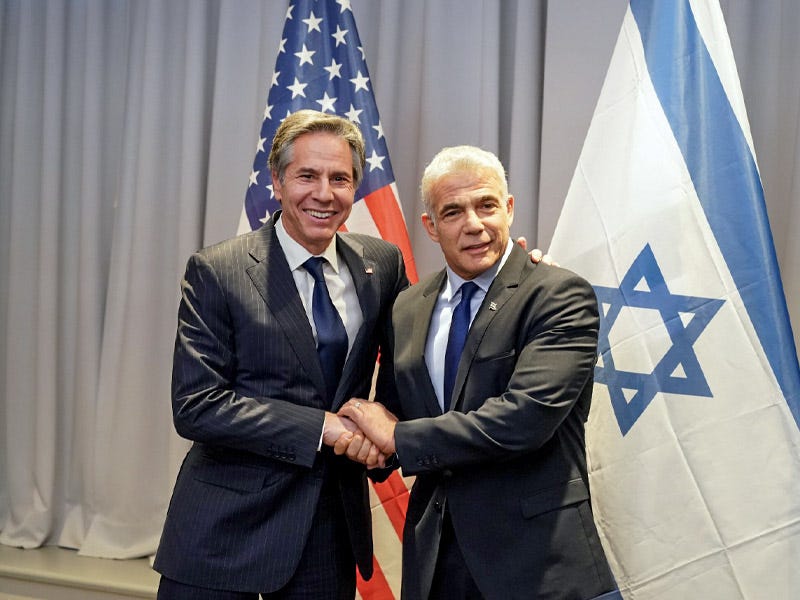Israel presses White House to publicly reject Iran Guards de-listing
Israel is pushing hard behind the scenes for the White House to publicly announce that President Biden won’t remove IRGC from State terror black list

Israel is pushing hard behind the scenes and in a series of strategic leaks for the White House to publicly announce that President Biden won’t remove Iran’s Islamic Revolutionary Guards Corps (IRGC) from a State Department terror black list.
A senior Israeli diplomat, speaking on background to Israeli journalists today (April 20), said that American officials “had notified their European counterparts that Washington does not plan on delisting” the IRGC from the State Department Foreign Terror Organization (FTO) list as part of the talks to restore the 2015 Iran nuclear deal, the Times of Israel reported today.
According to sources, the “senior Israeli diplomatic official” making that assertion was Israeli Foreign Minister Yair Lapid, with whom Secretary of State Antony Blinken spoke yesterday among other calls to try to deescalate tensions in Jerusalem.
It followed a report from Israeli newspaper Haaretz yesterday (April 19) that said Israeli officials expect Biden “to announce in the coming days whether he has decided to leave the Iranian Revolutionary Guards on the U.S. list of terrorist organizations or to accede to Tehran’s demand to remove the group from the list.”
“Until there is a clear statement, it’s impossible to know what the president’s final decision will be,” an Israeli official told Haaretz.
The paper reported that the media reports are part of an intensive Israeli campaign to try to pressure the Biden administration to publicly reject the Iranian request that is understood to be among the last outstanding issues to restoring the Iran nuclear pact, that has been fraying since then US President Trump, with Israeli prodding, quit the deal in 2018. In 2019, the Trump administration put the IRGC on the State Department FTO list. [The IRGC Qods Force was put on the Treasury Department Specially Designated Global Terrorism (SDGT) list in 2007, and the whole IRGC on the SDGT list in 2017].
I previously reported that the US had been expected to send a counter proposal earlier this month to Iran via the European Union on how to close remaining gaps to the restore the deal, but had decided last week not to do so.
A source close to the talks said the United States had notified European partners that Biden does not plan to unconditionally remove the IRGC from the FTO list. But that does not mean, the source added, “that he has decided to rule out all other middle-ground solutions.”
Israel’s ambassador to the United States Michael Herzog last week rejected a question asking if Israel was trying to spoil restoration of the nuclear deal by pressing the Biden administration not to delist the IRGC from the FTO black list.
“On the FTO [issue], I have yet to hear an explanation why, when you do a nuclear deal, you would take a decision on a terror list,” Herzog said at a breakfast hosted by Al-Monitor on April 14. “What's the connection … Someone has to explain that to me. I have not yet [heard] any good and convincing explanation on that.”
US officials, asked about the Israeli reports, have been fairly tight lipped.
“We are not negotiating in public and are not going to respond to specific claims about what sanctions we would be prepared to lift as part of a mutual return to full implementation of the JCPOA,” a State Department spokesperson told me by email today. “That said, if Iran wants sanctions lifting that goes beyond the JCPOA, they will need to address concerns of ours beyond the JCPOA.”
“Conversely, if they do not want to use these talks to resolve other bilateral issues beyond the JCPOA, then we are confident that we can very quickly reach an understanding on the JCPOA and begin reimplementing the deal,” the State Department spokesperson continued. “Iran needs to make a decision.”
The Iran Foreign Ministry said this week that there has been an exchange of messages between the US and Iran via the EU in recent weeks, but said Iran did not consider the US positions good enough.
"Messages (from Washington) sent through (European Union coordinator Enrique) Mora these past weeks... are far from providing solutions that could lead to an accord," Iran Foreign Ministry spokesman Saeed Khatibzadeh told reporters at the foreign ministry press briefing on Monday (April 18).
"The United States are responsible for these delays, because they are taking their time to give replies," he said.
EU coordinator Mora “continues to convey messages and is working to bring these negotiations to a successful conclusion,” State Department spokesman Ned Price told journalists at the State Department press briefing yesterday (April 19). Whether or not the US refrained from sending Iran a formal counter proposal in recent weeks, Price said Iran is well aware of the US position.
“Everyone who has been directly engaged in these talks knows which side has put constructive proposals on the table,” he said.
“The Iranians know where we stand on the various issues at play,” he said.
If neither side is prepared to find another way to overcome the final hurdle to restoring the deal, it also seems that neither side yet wants to declare that the talks have failed, said Trita Parsi, with the Quincy Institute.
“It seems like we are moving into the ‘zombie’ scenario… [in which] no one is willing to take the step that will be costly domestically to actually get to a deal, but they are also not willing to take the step of announcing or accepting the talks have failed,” Parsi told me. “That too is extremely costly.”
“It is a gray zone,” he said.


